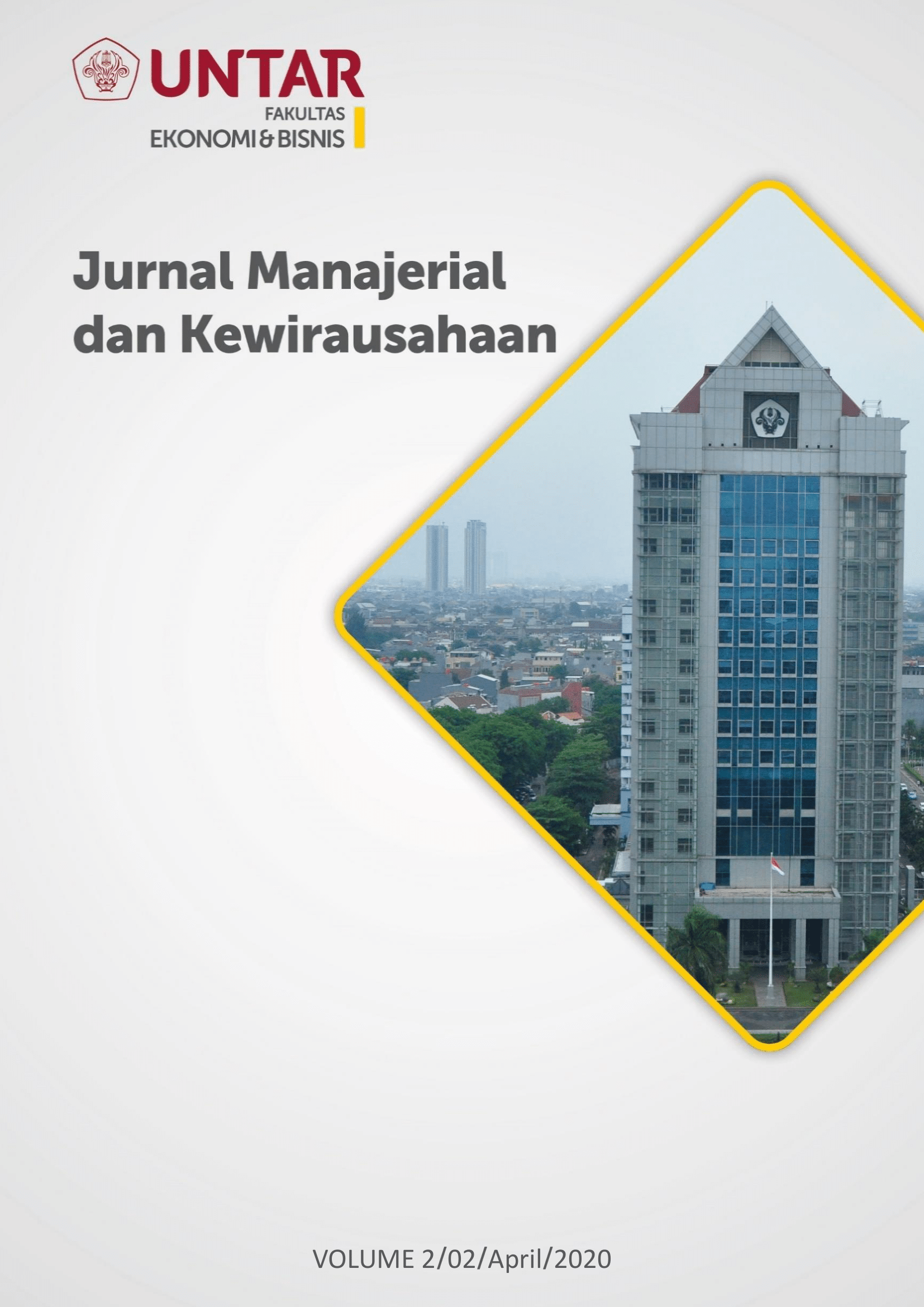Pengaruh Family-Work Conflict Terhadap Job Satisfaction Dengan Variabel Mediasi Work Engagement
Main Article Content
Abstract
This study aims to determine the effect of family-work conflict on job satisfaction with work engagement as mediating variable on retail employees of one company in Indonesia. Several studies previously showed that family-work conflict has no relationship with job satisfaction. In handling this gap, researcher try to add work engagement variable as mediating variable to connect the relationship and influence between family-work conflict and job satisfaction. This research uses Structural Equation Modeling (SEM) analysis as research method. A total of 100 respondents were used as research samples and used purposive sampling as sampling technique. This study shows that there is no influence between family-work conflict on job satisfaction and work engagement variable can be used as mediating variable between family-work conflict on job satisfaction.
Penelitian ini bertujuan untuk mengetahui pengaruh family-work conflict terhadap job satisfaction dengan work engagement sebagai variabel mediasi pada karyawan ritel salah satu perusahaan di Indonesia. Beberapa penelitian sebelumnya menunjukkan bahwa family-work conflict tidak memiliki hubungan dengan job satisfaction. Dalam menangani gap ini, peneliti mencoba untuk menambahkan variabel work engagement sebagai variabel mediasi untuk menjembatani hubungan serta pengaruh antara family-work conflict dengan job satisfaction. Penelitian ini menggunakan analisis Structural Equation Modeling (SEM) sebagai metode penelitian. Sebanyak 100 responden digunakan sebagai sampel penelitian dan menggunakan purposive sampling sebagai teknik sampling. Penelitian ini menunjukkan bahwa tidak terdapat pengaruh antara family-work conflict terhadap job satisfaction dan variabel work engagement dapat digunakan sebagai variabel mediasi antara family-work conflict terhadap job satisfaction.
Article Details
This work is licensed under a Jurnal Muara Ilmu Ekonomi dan Bisnis Creative Commons Attribution-ShareAlike 4.0 International License.,/p>
References
Abdurrahman, D., Fadilah, S. and Suarsih, S. (2010). Hubungan Konflik Keluarga Pekerjaan dengan Kepuasan Kerja dan Niat Keluar Kerja. Mimbar, XXVI(1), pp. 1–15.
Bhalla, A. and Kang, L. S. (2019). Domain-specific and nonspecific outcomes of work-family interface: A study of Indian journalists. Evidence-based HRM, 7(2), pp. 127–142. doi: 10.1108/EBHRM-10-2017-0053.
Choi, H. J. and Kim, Y. T. (2010). Work-family conflict, work-family facilitation, and job outcomes in the Korean hotel industry. International Journal of Contemporary Hospitality Management, 24(7), pp. 1–5.
Chung, T. L., Rutherford, B. and Park, J. (2012). Understanding multifaceted job satisfaction of retail employees. International Journal of Retail and Distribution Management, 40(9), pp. 699–716. doi: 10.1108/09590551211255974.
Ghosh, P., Jawahar, I. M. and Rai, A. (2019). Do men and women experience work engagement and job satisfaction to the same extent in collectivistic, patriarchal societies? International Journal of Manpower. doi: 10.1108/IJM-11-2018-0378.
Griffin, M. L. et al. (2010). Job involvement, job stress, job satisfaction, and organizational commitment and the burnout of correctional staff. Criminal Justice and Behavior, 37(2), pp. 239–255. doi: 10.1177/0093854809351682.
Hair, J. F. et al. (2014) Multivariate Data Analysis (MVDA). 7th edn, Pharmaceutical Quality by Design: A Practical Approach. 7th edn. Harlow, England: Pearson Education Limited. doi: 10.1002/9781118895238.ch8.
Hair Jr, J. F. et al. (2014). Partial least squares structural equation modeling (PLS-SEM): An emerging tool in business research. Practical Assessment, Research and Evaluation, 26(2), pp. 106–121. doi: 10.1108/ebr-10-2013-0128.
Islam, T. et al. (2019). Police work-family nexus, work engagement and turnover intention: Moderating role of person-job-fit. Policing, 42(5), pp. 739–750. doi: 10.1108/PIJPSM-09-2018-0138.
Karatepe, O. M. and Karadas, G. (2016). Service employees’ fit, work-family conflict, and work engagement. Journal of Services Marketing, 30(5), pp. 554–566. doi: 10.1108/JSM-02-2015-0066.
Miheli?, K. K. (2014). Work-family interface, job satisfaction and turnover intention: A CEE transition country perspective. Baltic Journal of Management, 9(4), pp. 446– 466. doi: 10.1108/BJM-09-2013-0141.
Netemeyer, R. G., Boles, J. S. and McMurrian, R. (1996). Development and validation of work-family conflict and family-work conflict scales. Journal of Applied Psychology, 81(4), pp. 400–410. doi: 10.1037/0021-9010.81.4.400.
Rotondo, D. M. and Kincaid, J. F. (2008). Conflict, facilitation, and individual coping styles across the work and family domains. Journal of Managerial Psychology, 23(5), pp. 484–506. doi: 10.1108/02683940810884504.
Schaufeli, W. B., Bakker, A. B. and Salanova, M. (2006). The measurement of work engagement with a short questionnaire: A cross-national study. Educational and Psychological Measurement, 66(4), pp. 701–716. doi: 10.1177/0013164405282471.
Singh, R. and Nayak, J. K. (2015). Mediating role of stress between work-family conflict and job satisfaction among the police officials: Moderating role of social support. Policing, 38(4), pp. 738–753. doi: 10.1108/PIJPSM-03-2015-0040.
Yeh, C. M. (2013). Tourism involvement, work engagement and job satisfaction among frontline hotel employees. Annals of Tourism Research. Elsevier Ltd, 42, pp. 214– 239. doi: 10.1016/j.annals.2013.02.002.



